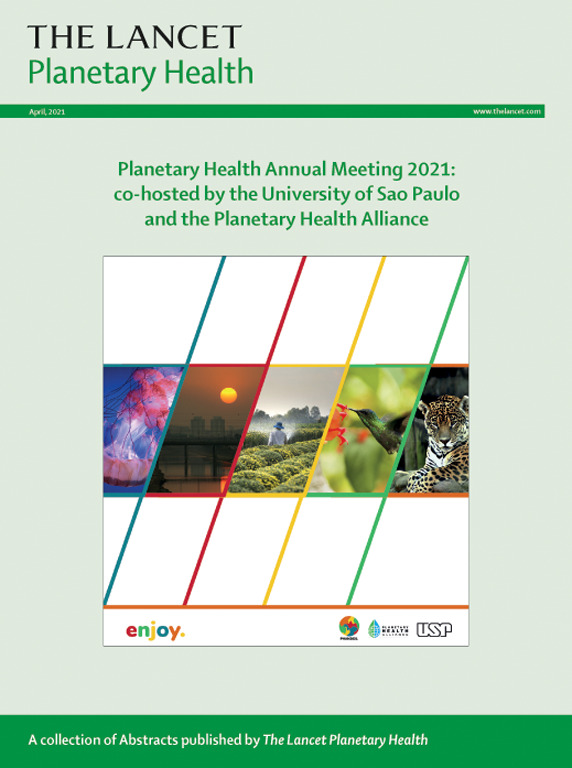Community-based heat adaptation interventions for improving heat literacy, behaviours, and health outcomes: a systematic review
IF 21.6
1区 医学
Q1 ENVIRONMENTAL SCIENCES
引用次数: 0
Abstract
Anthropogenic climate change, resulting in a continuous rise of global temperature, has detrimental effects on human health, particularly among vulnerable populations, such as individuals with low income, older adults, and people with pre-existing health conditions. To reduce the heat-related health consequences, effective interventions targeting community members, especially vulnerable populations, are paramount. This systematic review aims to identify and evaluate the effectiveness of community-based heat adaptation behavioural interventions aimed at improving heat literacy, promoting adaptive behaviours, and enhancing health outcomes amid rising global temperatures. In this systematic review, peer-reviewed English-language articles focused on community-based heat adaptation intervention studies published in PubMed, MEDLINE via Ovid, Embase, CINAHL, Scopus, and Web of Science from database inception to Jan 1, 2024, were retrieved and reported according to the PRISMA 2020 guidelines. The quality of the articles was evaluated with the use of a mixed-methods appraisal tool. The analysis synthesised intervention effectiveness across multiple outcome domains measurable at both individual and household levels, identified key factors influencing successful implementation, and highlighted areas for future research. The initial search yielded 1266 articles, of which ten were finally included. The majority of the included studies (n=7) were from high-income countries. Most intervention modules focused on preventive measures during heat exposure, whereas only a few addressed information on disease mechanisms, risk factors, and monitoring environmental changes. Although most studies reported significant improvements in heat literacy and a reduction in heat-related symptoms, the evidence for behavioural changes and health outcomes was mixed. Our review reveals methodological shortcomings, as none of the included studies incorporated heat literacy frameworks, behavioural theory, or participatory approaches to include community input throughout the research. Our findings highlight the need for a comprehensive approach that incorporates frameworks to enhance intervention effectiveness and improve public health resilience amid rising global temperatures. Culturally appropriate community-led interventions and integration of digital tools are promising avenues for increasing uptake of interventions. This study is registered with PROSPERO (CRD42024514188).
以社区为基础的热适应干预措施改善热素养、行为和健康结果:一项系统综述。
人为气候变化导致全球气温持续上升,对人类健康产生不利影响,特别是对低收入个人、老年人和已有健康问题的人等弱势群体。为了减少与热有关的健康后果,针对社区成员,特别是弱势群体的有效干预措施至关重要。本系统综述旨在识别和评估基于社区的热适应行为干预措施的有效性,这些干预措施旨在提高热素养,促进适应行为,并在全球气温上升的情况下改善健康结果。在本系统综述中,根据PRISMA 2020指南检索并报告了从数据库建立到2024年1月1日,通过Ovid、Embase、CINAHL、Scopus和Web of Science在PubMed、MEDLINE上发表的同行评议的基于社区的热适应干预研究的英文文章。使用混合方法评估工具对文章的质量进行评估。该分析综合了在个人和家庭层面可测量的多个结果领域的干预效果,确定了影响成功实施的关键因素,并强调了未来研究的领域。最初的搜索产生了1266篇文章,其中10篇最终被收录。大多数纳入的研究(n=7)来自高收入国家。大多数干预模块侧重于热暴露期间的预防措施,而只有少数涉及疾病机制、风险因素和监测环境变化的信息。虽然大多数研究报告说,热知识显著提高,热相关症状减少,但行为改变和健康结果的证据好坏参半。我们的回顾揭示了方法上的缺陷,因为纳入的研究中没有一项纳入热素养框架、行为理论或参与性方法,以在整个研究过程中纳入社区投入。我们的研究结果强调,在全球气温上升的情况下,需要一种综合的方法,包括加强干预有效性和改善公共卫生复原力的框架。在文化上适当的社区主导的干预措施和数字工具的整合是提高干预措施接受度的有希望的途径。本研究已在PROSPERO注册(CRD42024514188)。
本文章由计算机程序翻译,如有差异,请以英文原文为准。
求助全文
约1分钟内获得全文
求助全文
来源期刊

Lancet Planetary Health
Multiple-
CiteScore
28.40
自引率
2.30%
发文量
272
审稿时长
8 weeks
期刊介绍:
The Lancet Planetary Health is a gold Open Access journal dedicated to investigating and addressing the multifaceted determinants of healthy human civilizations and their impact on natural systems. Positioned as a key player in sustainable development, the journal covers a broad, interdisciplinary scope, encompassing areas such as poverty, nutrition, gender equity, water and sanitation, energy, economic growth, industrialization, inequality, urbanization, human consumption and production, climate change, ocean health, land use, peace, and justice.
With a commitment to publishing high-quality research, comment, and correspondence, it aims to be the leading journal for sustainable development in the face of unprecedented dangers and threats.
 求助内容:
求助内容: 应助结果提醒方式:
应助结果提醒方式:


